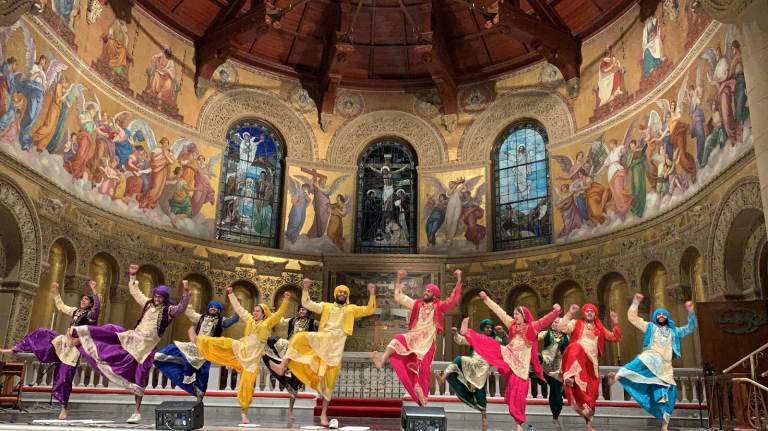When the pandemic hit and sent Stanford students home, many student organizations were forced to shift to an online model while some stopped meeting altogether. But Stanford Bhangra kept on dancing.
Bhangra is a traditional Indian dance form from the Punjab region influenced by the work of farmers, or kissans, to tell stories, often at important events like harvest festivals. Stanford’s student-run Bhangra club features more than 30 members who work tirelessly to bring this colorful, energetic art form to life for the community.
The club participates in several competitions each year and placed third in the East Coast Showdown in winter 2020. The team also performs its three- to 10-minute routines at off-campus gigs, including the occasional wedding, to fundraise.
At the onset of the pandemic, Stanford Bhangra transitioned to a virtual model with members learning new dances by watching tutorial videos. While on campus, club members had typically practiced three times each week for two hours at a time to learn the dances, making this online task no small feat.
As co-captain Sarah MacHarg ’24 highlighted, though, the team was already using Facebook to post videos and practice choreography, which helped expedite the club’s transition to virtual.
Soon after students returned to campus, the club started meeting outside, which posed another set of challenges.
According to MacHarg, even though there were no mirrors, she was “impressed with how well all of our auditionees were able to pick up the choreography even not being able to see themselves. It was kind of crazy doing it outside in the sun, but we brought lots of water.”
Even in this unpredictable environment, “everybody managed to pull through, and it seemed like folks had a good time,” MacHarg added. More recently, dancers were back to practicing at Arrillaga Center and other campus gyms that provide dance surfaces suitable for Bhangra’s intense dance style. The club’s approach, however, has had to change again due to Stanford’s new restrictions on student organization gatherings for the winter quarter.
The club’s flexibility in the face of COVID-19 also mirrors its members’ approach to performing Bhangra. While remaining close to the historical Indian roots of the dance, the club is not afraid to push the boundaries and try new things. MacHarg said that the choreography process is generally very collaborative.
“We have a lot of experienced dancers who know Punjabi culture and traditional moves and are able to help us get started and give feedback. We usually never have it finalized until the day before we perform,” she said.
Performance costumes are one of the many distinguishing aspects of the Bhangra dance. Elaborate, brightly colored outfits complete with intricate headdresses contribute to the spectacle of the show.
“The current (uniforms) that we wear, we actually got embroidered and made in India,” said co-captain Aman Malhotra ’23. “We usually get new outfits every three or four years, but the style of outfits originates from Punjab of India.”
The club comprises members with a range of dance backgrounds, including some new to Bhangra or dance entirely. While Malhotra did not grow up dancing Bhangra, he is familiar with Punjabi music given his family background.
“Our other co-captain, Sarah, has been trained in a lot of other dance forms. And when we’re choreographing, she’ll draw from ballet or tango,” Malhotra said.
Club tryouts typically happen over two days during the first few weeks of the fall quarter. At the beginning of these sessions, the club runs a workshop where participants can learn the basic dance moves in a low-stress, collaborative environment.
People attend the Bhangra workshops each year, Malhotra said, because they enjoy listening to this type of music and learning new dance moves.
Co-captain Damanpreet Singh ’24 said that one of his favorite aspects of Stanford Bhangra is that the team has a tight-knit culture.
“It doesn’t just stop at the dance floor. We all make friendships within the team that go into classes, meals and other activities,” Damanpreet said.
